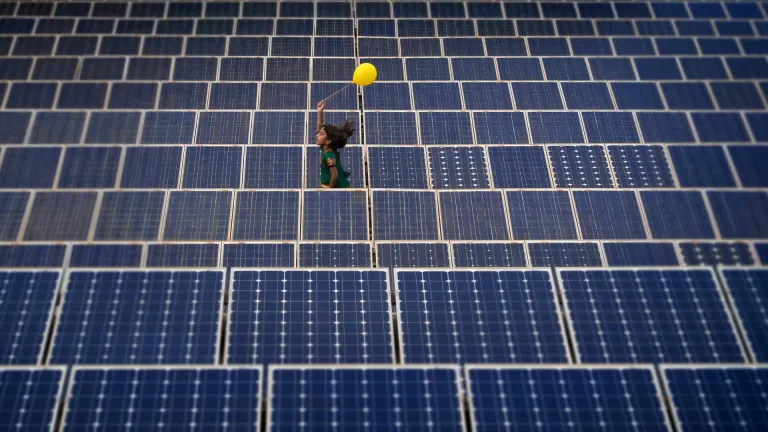Sustainability Matters: Why Rooftop Solar is Your Green Energy Solution
- By user

In an era where environmental consciousness is at the forefront of global conversations, individuals and businesses alike are seeking ways to reduce their carbon footprint and contribute to a more sustainable future. One of the most impactful solutions gaining popularity is rooftop solar energy. Harnessing the power of the sun to generate electricity not only provides an eco-friendly alternative to conventional energy sources but also offers a range of environmental benefits that extend far beyond the immediate consumer.
Rooftop solar, allows individuals and businesses to transform their rooftops into mini power plants. By capturing sunlight and converting it into electricity, these systems offer a clean and renewable energy source that significantly mitigates reliance on fossil fuels. The environmental advantages of rooftop solar are numerous, making it a crucial component in the global effort to combat climate change. The benefits include:
- Reducing Carbon Footprint
- Energy Independence and Sustainable Living
- Efficient Land Use and Biodiversity Conservation
- Minimal Environmental Impact
- Financial Incentives for Sustainability
Reducing Carbon Footprint
One of the primary benefits of rooftop solar is its remarkable ability to reduce carbon emissions. Traditional energy sources, such as coal and natural gas, release harmful greenhouse gases into the atmosphere, contributing to climate change and air pollution. In contrast, solar energy produces electricity without emitting any greenhouse gases during operation. By adopting rooftop solar, individuals actively contribute to the reduction of carbon emissions, helping combat the adverse effects of climate change on a local and global scale.
Energy Independence and Sustainable Living
Investing in rooftop solar not only minimizes environmental impact but also promotes energy independence. By generating electricity on-site, individuals and businesses can reduce their reliance on centralized power grids and traditional energy sources. This decentralization of energy production empowers consumers to take control of their energy consumption, fostering a sense of independence and resilience in the face of changing energy landscapes. Furthermore, rooftop solar allows individuals to embrace sustainable living by tapping into a constant and renewable energy source. Unlike finite fossil fuels, solar energy is abundant and inexhaustible. Adopting rooftop solar is a forward-thinking decision that aligns with the principles of sustainability, ensuring a cleaner and greener future for generations to come.
Efficient Land Use and Biodiversity Conservation
Unlike large-scale solar farms that may require significant land areas, rooftop solar utilizes existing structures without the need for additional space. This efficient use of space minimizes the environmental impact associated with land use changes and preserves natural habitats. As a result, rooftop solar contributes to biodiversity conservation by avoiding the disruption of ecosystems that occurs with conventional energy infrastructure projects.
Minimal Environmental Impact
The installation and maintenance of rooftop solar systems have minimal environmental impact compared to traditional energy infrastructure projects. Solar panels are designed to be durable and long-lasting, with a lifespan exceeding 25 years. Additionally, advancements in technology have led to more sustainable manufacturing processes for solar panels, reducing their environmental footprint.
Moreover, the operation of rooftop solar systems produces little to no noise or air pollution. This contrasts sharply with traditional energy sources that often involve noisy machinery and emit pollutants harmful to both the environment and human health. Rooftop solar provides a quiet and clean energy solution that integrates seamlessly into urban and suburban environments, contributing to healthier communities.
Financial Incentives for Sustainability
Beyond the environmental benefits, investing in rooftop solar can be financially rewarding. The central government provides capital subsidies to households to encourage the adoption of renewable energy technologies. These financial benefits make rooftop solar not only an environmentally conscious choice but also a savvy economic decision.
By taking advantage of these incentives, households can offset the initial costs of installing solar panels, making the transition to clean energy more accessible and affordable. Over time, the savings on electricity bills and potential income from selling excess energy back to the grid can further enhance the financial viability of rooftop solar investments.
Conclusion: A Sustainable Future with Rooftop Solar
In the pursuit of a sustainable future, rooftop solar emerges as a beacon of hope, offering a practical and impactful solution to address environmental challenges. By harnessing the power of the sun, individuals and businesses can significantly reduce their carbon footprint, contribute to biodiversity conservation, and promote energy independence.
The capital subsidy provided by the government to households further sweetens the deal, making rooftop solar an attractive option for those seeking both environmental and economic benefits. As we collectively strive to build a greener and more sustainable world, rooftop solar stands out as a tangible and effective step towards a future powered by clean, renewable energy. So, if sustainability matters to you, consider the green energy solution that is right above your head – rooftop solar.
